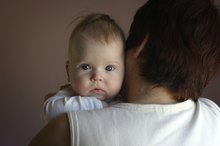What does fact checked mean?
At Healthfully, we strive to deliver objective content that is accurate and up-to-date. Our team periodically reviews articles in order to ensure content quality. The sources cited below consist of evidence from peer-reviewed journals, prominent medical organizations, academic associations, and government data.
The information contained on this site is for informational purposes only, and should not be used as a substitute for the advice of a professional health care provider. Please check with the appropriate physician regarding health questions and concerns. Although we strive to deliver accurate and up-to-date information, no guarantee to that effect is made.
Normative Development in a Child
The first three years of your child's life are the most crucial to his development 13. During this time, he will transform from a helpless infant to a child with advanced mental, emotional and physical responses. While every child develops at his own pace, many important milestones coincide with a particular age range. It is important to know what your child should be doing at each age so you can monitor his development and quickly identify any developmental delays.
Three Months
At three months, your baby is beginning to explore the visual world. He especially enjoys faces, which he now recognizes as something different than mere objects. He will stare and smile at you and begin to imitate your expressions.
He will also begin to imitate sounds and movements using his developing motor control. He will raise his head and chest when placed on his stomach, stretch his arms and legs, open and close his hands and grasp items. He will also rise onto his elbows to examine his environment.
- At three months, your baby is beginning to explore the visual world.
- He will raise his head and chest when placed on his stomach, stretch his arms and legs, open and close his hands and grasp items.
Four to Six Months
Activities to Promote Perceptual & Motor Skills
Learn More
At four to six months, your baby can identify familiar people, especially his mother.
**He enjoys his hands, will reach for things and will often put them in his mouth.
He will respond to sound as well as babble and imitate simple noises. ** His head control is nearly complete and he can now roll from his back to his stomach. His appetite is not as voracious as it once was and he will often eat only three to five times per day. He may be ready for soft cereals and gentle baby foods in addition to milk.
- At four to six months, your baby can identify familiar people, especially his mother.
- He will respond to sound as well as babble and imitate simple noises.
Seven to Nine Months
**Many babies begin to experience separation anxiety at seven months.
This is part of normal development, since it indicates he has both identified and emotionally bonded with his mother. He now has complete control of his hands and upper body, can sit upright, roll from his stomach to his back, crawl and grasp objects with one hand.
** He will also respond to emotions, which he can distinguish by the tone of your voice. Peek-a-boo is often a favorite game at this age, which can bring squeals of delight.
- Many babies begin to experience separation anxiety at seven months.
- This is part of normal development, since it indicates he has both identified and emotionally bonded with his mother.
One Year
Where Should a 3 1/2-Year-Old Be Developmentally?
Learn More
At one year or shortly after, your baby will take his first steps. At first he will pull himself up using the furniture and walk around. Then he will begin to toddle without assistance. He will also be able to pull himself up to a sitting position, feed himself and use a pincer grasp. He will often enjoy shaking, throwing and banging things together.
He will be able to feed himself finger foods and use a cup, although he may not eat or drink neatly. He can also say simple words, understand requests and simple commands.
- At one year or shortly after, your baby will take his first steps.
- He will be able to feed himself finger foods and use a cup, although he may not eat or drink neatly.
Two Years
**Between one and two years, your child will learn to scribble with a crayon, eat with a spoon, run, kick and build with blocks.
** He will become more social and enjoy the company of other children, although he may play alongside them instead of directly with them.
He can also play make-believe, understand up to 200 words and speak in short sentences. He may also become increasingly willful and knowingly disobey commands.
- Between one and two years, your child will learn to scribble with a crayon, eat with a spoon, run, kick and build with blocks.
- He will become more social and enjoy the company of other children, although he may play alongside them instead of directly with them.
Three Years
By age three, your child will be able to use pronouns appropriately most of the time. He will have a large vocabulary consisting of all the parts of speech, which he will use to talk in paragraphs, sing songs and express his emotions, which may be volatile. He will often disobey, give commands and resist change but he will also become affectionate with friends and family, learn to take turns and share. He will develop gross motor skills, such as climbing and walking up the stairs one at a time as well as fine motor skills, such as turning single pages and coloring with a crayon.
- By age three, your child will be able to use pronouns appropriately most of the time.
- He will often disobey, give commands and resist change but he will also become affectionate with friends and family, learn to take turns and share.
Related Articles
References
Writer Bio
Kylene Arnold is a freelance writer who has written for a variety of print and online publications. She has acted as a copywriter and screenplay consultant for Advent Film Group and as a promotional writer for Cinnamom Bakery. She holds a Bachelor of Science in cinema and video production from Bob Jones University.









